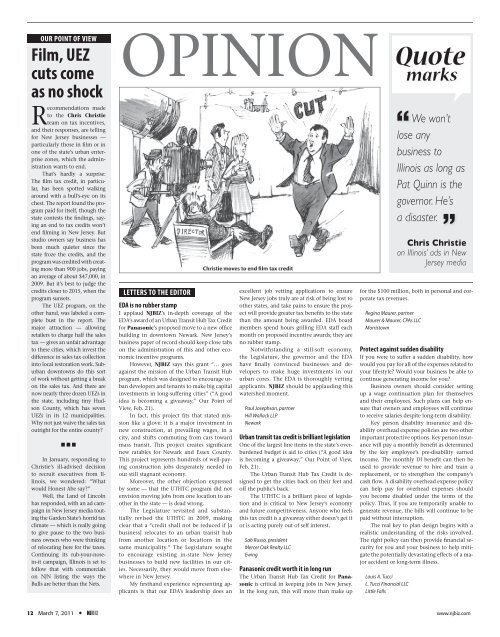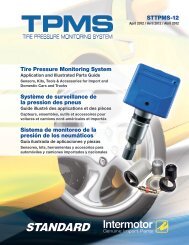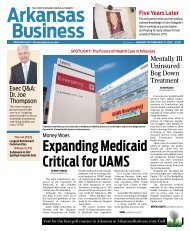New Jersey - Digital Publishing
New Jersey - Digital Publishing
New Jersey - Digital Publishing
Create successful ePaper yourself
Turn your PDF publications into a flip-book with our unique Google optimized e-Paper software.
oUr poinT of VieW<br />
film, UeZ<br />
cuts come<br />
as no shock<br />
Recommendations made<br />
to the Chris Christie<br />
team on tax incentives,<br />
and their responses, are telling<br />
for <strong>New</strong> <strong>Jersey</strong> businesses —<br />
particularly those in fi lm or in<br />
one of the state’s urban enterprise<br />
zones, which the administration<br />
wants to end.<br />
That’s hardly a surprise:<br />
The fi lm tax credit, in particular,<br />
has been spotted walking<br />
around with a bull’s-eye on its<br />
chest. The report found the program<br />
paid for itself, though the<br />
state contests the fi ndings, saying<br />
an end to tax credits won’t<br />
end fi lming in <strong>New</strong> <strong>Jersey</strong>. But<br />
studio owners say business has<br />
been much quieter since the<br />
state froze the credits, and the<br />
program was credited with creating<br />
more than 900 jobs, paying<br />
an average of about $47,000, in<br />
2009. But it’s best to judge the<br />
credits closer to 2015, when the<br />
program sunsets.<br />
The UEZ program, on the<br />
other hand, was labeled a complete<br />
bust in the report. The<br />
major attraction — allowing<br />
retailers to charge half the sales<br />
tax — gives an unfair advantage<br />
to these cities, which invest the<br />
difference in sales tax collection<br />
into local restoration work. Suburban<br />
downtowns do this sort<br />
of work without getting a break<br />
on the sales tax. And there are<br />
now nearly three dozen UEZs in<br />
the state, including tiny Hudson<br />
County, which has seven<br />
UEZs in its 12 municipalities.<br />
Why not just waive the sales tax<br />
outright for the entire county?<br />
■ ■ ■<br />
In January, responding to<br />
Christie’s ill-advised decision<br />
to recruit executives from Illinois,<br />
we wondered: “What<br />
would Honest Abe say?”<br />
Well, the Land of Lincoln<br />
has responded, with an ad campaign<br />
in <strong>New</strong> <strong>Jersey</strong> media touting<br />
the Garden State’s horrid tax<br />
climate — which is really going<br />
to give pause to the two business<br />
owners who were thinking<br />
of relocating here for the taxes.<br />
Continuing its rub-your-nosein-it<br />
campaign, Illinois is set to<br />
follow that with commercials<br />
on NJN listing the ways the<br />
Bulls are better than the Nets.<br />
OPINION<br />
leTTerS To THe eDiTor<br />
eDA is no rubber stamp<br />
I applaud NJBIZ’s in-depth coverage of the<br />
EDA’s award of an Urban Transit Hub Tax Credit<br />
for Panasonic’s proposed move to a new offi ce<br />
building in downtown <strong>New</strong>ark. <strong>New</strong> <strong>Jersey</strong>’s<br />
business paper of record should keep close tabs<br />
on the administration of this and other economic<br />
incentive programs.<br />
However, NJBIZ says this grant “… goes<br />
against the mission of the Urban Transit Hub<br />
program, which was designed to encourage urban<br />
developers and tenants to make big capital<br />
investments in long-suffering cities” (“A good<br />
idea is becoming a giveaway,” Our Point of<br />
View, Feb. 21).<br />
In fact, this project fi ts that stated mission<br />
like a glove: it is a major investment in<br />
new construction, at prevailing wages, in a<br />
city, and shifts commuting from cars toward<br />
mass transit. This project creates signifi cant<br />
new ratables for <strong>New</strong>ark and Essex County.<br />
This project represents hundreds of well-paying<br />
construction jobs desperately needed in<br />
our still stagnant economy.<br />
Moreover, the other objection expressed<br />
by some — that the UTHTC program did not<br />
envision moving jobs from one location to another<br />
in the state — is dead wrong.<br />
The Legislature revisited and substantially<br />
revised the UTHTC in 2009, making<br />
clear that a “credit shall not be reduced if [a<br />
business] relocates to an urban transit hub<br />
from another location or locations in the<br />
same municipality.” The Legislature sought<br />
to encourage existing in-state <strong>New</strong> <strong>Jersey</strong><br />
businesses to build new facilities in our cities.<br />
Necessarily, they would move from elsewhere<br />
in <strong>New</strong> <strong>Jersey</strong>.<br />
My fi rsthand experience representing applicants<br />
is that our EDA’s leadership does an<br />
excellent job vetting applications to ensure<br />
<strong>New</strong> <strong>Jersey</strong> jobs truly are at risk of being lost to<br />
other states, and take pains to ensure the project<br />
will provide greater tax benefi ts to the state<br />
than the amount being awarded. EDA board<br />
members spend hours grilling EDA staff each<br />
month on proposed incentive awards; they are<br />
no rubber stamp.<br />
Notwithstanding a still-soft economy,<br />
the Legislature, the governor and the EDA<br />
have fi nally convinced businesses and developers<br />
to make huge investments in our<br />
urban cores. The EDA is thoroughly vetting<br />
applicants. NJBIZ should be applauding this<br />
watershed moment.<br />
Paul Josephson, partner<br />
Hill Wallack LLP<br />
<strong>New</strong>ark<br />
Urban transit tax credit is brilliant legislation<br />
One of the largest line items in the state’s overburdened<br />
budget is aid to cities (“A good idea<br />
is becoming a giveaway,” Our Point of View,<br />
Feb. 21).<br />
The Urban Transit Hub Tax Credit is designed<br />
to get the cities back on their feet and<br />
off the public’s back.<br />
The UTHTC is a brilliant piece of legislation<br />
and is critical to <strong>New</strong> <strong>Jersey</strong>’s economy<br />
and future competitiveness. Anyone who feels<br />
this tax credit is a giveaway either doesn’t get it<br />
or is acting purely out of self interest.<br />
Sab Russo, president<br />
Mercer Oak Realty LLC<br />
Ewing<br />
panasonic credit worth it in long run<br />
The Urban Transit Hub Tax Credit for Panasonic<br />
is critical in keeping jobs in <strong>New</strong> <strong>Jersey</strong>.<br />
In the long run, this will more than make up<br />
We won’t<br />
lose any<br />
business to<br />
Illinois as long as<br />
Pat Quinn is the<br />
governor. He’s<br />
a disaster.<br />
Chris Christie<br />
on Illinois’ ads in <strong>New</strong><br />
<strong>Jersey</strong> media<br />
for the $100 million, both in personal and corporate<br />
tax revenues.<br />
Regina Maurer, partner<br />
Maurer & Maurer, CPAs LLC<br />
Morristown<br />
protect against sudden disability<br />
If you were to suffer a sudden disability, how<br />
would you pay for all of the expenses related to<br />
your lifestyle? Would your business be able to<br />
continue generating income for you?<br />
Business owners should consider setting<br />
up a wage continuation plan for themselves<br />
and their employees. Such plans can help ensure<br />
that owners and employees will continue<br />
to receive salaries despite long-term disability.<br />
Key person disability insurance and disability<br />
overhead expense policies are two other<br />
important protective options. Key person insurance<br />
will pay a monthly benefi t as determined<br />
by the key employee’s pre-disability earned<br />
income. The monthly DI benefi t can then be<br />
used to provide revenue to hire and train a<br />
replacement, or to strengthen the company’s<br />
cash fl ow. A disability overhead expense policy<br />
can help pay for overhead expenses should<br />
you become disabled under the terms of the<br />
policy. Thus, if you are temporarily unable to<br />
generate revenue, the bills will continue to be<br />
paid without interruption.<br />
The real key to plan design begins with a<br />
realistic understanding of the risks involved.<br />
The right policy can then provide fi nancial security<br />
for you and your business to help mitigate<br />
the potentially devastating effects of a major<br />
accident or long-term illness.<br />
Louis A. Tucci<br />
L. Tucci Financial LLC<br />
Little Falls<br />
Quote<br />
marks<br />
12 March 7, 2011 ◆ njbiz www.njbiz.com
















